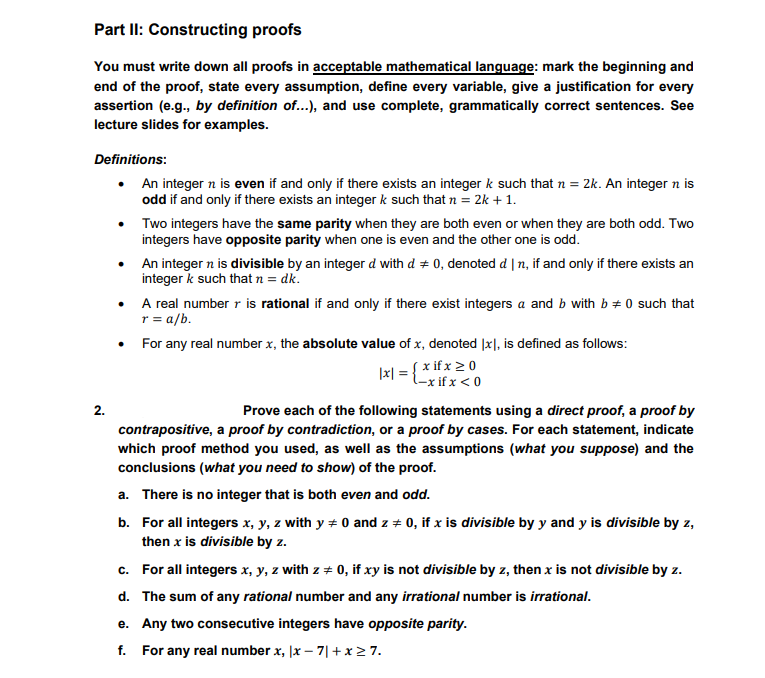2. Prove each of the following statements using a direct proof, a proof by contrapositive, a proof by contradiction, or a proof by cases. For each statement, indicate which proof method you used, as well as the assumptions (what you suppose) and the conclusions (what you need to show) of the proof. a. There is no integer that is both even and odd. b. For all integers x, y, z with y + 0 and z + 0, if x is divisible by y and y is divisible by z, then x is divisible by z. | z. c. For all integers x, y, z with z + 0, if xy is not divisible by z, then x is not divisible by z.
2. Prove each of the following statements using a direct proof, a proof by contrapositive, a proof by contradiction, or a proof by cases. For each statement, indicate which proof method you used, as well as the assumptions (what you suppose) and the conclusions (what you need to show) of the proof. a. There is no integer that is both even and odd. b. For all integers x, y, z with y + 0 and z + 0, if x is divisible by y and y is divisible by z, then x is divisible by z. | z. c. For all integers x, y, z with z + 0, if xy is not divisible by z, then x is not divisible by z.
Chapter8: Sequences, Series,and Probability
Section8.6: Counting Principles
Problem 22E: License Plate Numbers In a certain state, each automobile license plate number consists of two...
Related questions
Question
100%
Do Part A, B, C please.

Transcribed Image Text:Part II: Constructing proofs
You must write down all proofs in acceptable mathematical language: mark the beginning and
end of the proof, state every assumption, define every variable, give a justification for every
assertion (e.g., by definition of...), and use complete, grammatically correct sentences. See
lecture slides for examples.
Definitions:
An integer n is even if and only if there exists an integer k such that n = 2k. An integer n is
odd if and only if there exists an integer k such that n = 2k + 1.
Two integers have the same parity when they are both even or when they are both odd. Two
integers have opposite parity when one is even and the other one is odd.
• An integer n is divisible by an integer d with d + 0, denoted d | n, if and only if there exists an
integer k such that n = dk.
A real number r is rational if and only if there exist integers a and b with b + 0 such that
r = a/b.
• For any real number x, the absolute value of x, denoted |x|, is defined as follows:
|x| = { x if x > 0
l-x if x < 0
2.
Prove each of the following statements using a direct proof, a proof by
contrapositive, a proof by contradiction, or a proof by cases. For each statement, indicate
which proof method you used, as well as the assumptions (what you suppose) and the
conclusions (what you need to show) of the proof.
a. There is no integer that is both even and odd.
b. For all integers x, y, z with y + 0 and z + 0, if x is divisible by y and y is divisible by z,
then x is divisible by z.
c. For all integers x, y, z with z + 0, if xy is not divisible by z, then x is not divisible by z.
d. The sum of any rational number and any irrational number is irrational.
e. Any two consecutive integers have opposite parity.
f. For any real number x, |x –- 7|+x2 7.
Expert Solution
This question has been solved!
Explore an expertly crafted, step-by-step solution for a thorough understanding of key concepts.
This is a popular solution!
Trending now
This is a popular solution!
Step by step
Solved in 4 steps

Recommended textbooks for you


Algebra & Trigonometry with Analytic Geometry
Algebra
ISBN:
9781133382119
Author:
Swokowski
Publisher:
Cengage

College Algebra (MindTap Course List)
Algebra
ISBN:
9781305652231
Author:
R. David Gustafson, Jeff Hughes
Publisher:
Cengage Learning


Algebra & Trigonometry with Analytic Geometry
Algebra
ISBN:
9781133382119
Author:
Swokowski
Publisher:
Cengage

College Algebra (MindTap Course List)
Algebra
ISBN:
9781305652231
Author:
R. David Gustafson, Jeff Hughes
Publisher:
Cengage Learning

College Algebra
Algebra
ISBN:
9781305115545
Author:
James Stewart, Lothar Redlin, Saleem Watson
Publisher:
Cengage Learning

Elementary Geometry For College Students, 7e
Geometry
ISBN:
9781337614085
Author:
Alexander, Daniel C.; Koeberlein, Geralyn M.
Publisher:
Cengage,

Elements Of Modern Algebra
Algebra
ISBN:
9781285463230
Author:
Gilbert, Linda, Jimmie
Publisher:
Cengage Learning,